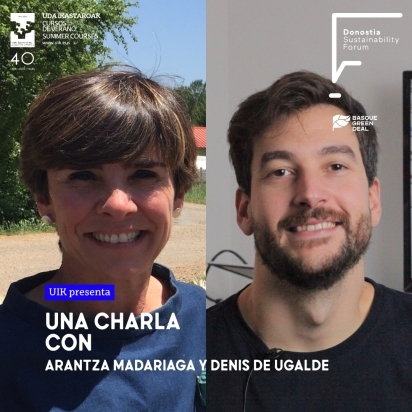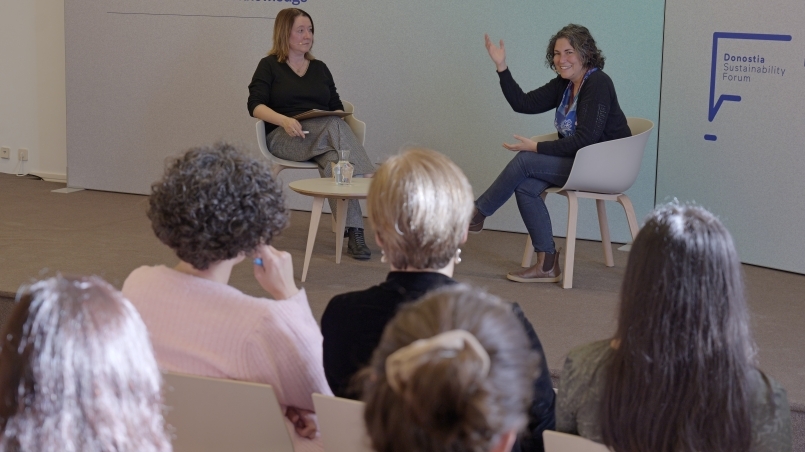Ending food waste is not a matter of willpower
<p> To do things well, we must ensure that no one loses and that everyone sees their effort rewarded.</p>

By the end of this year, Oreka will have received and delivered between 75,000 and 100,000 meals, about 30 tons of food worth between 150 and 200,000 €.
30 tons of food that has fulfilled its function and has not increased the pathetic number of kilos of food that is currently being wasted.
Oreka operates in Bizkaia, Galicia and Madrid. The first experimental tests were carried out in the pre-covid period at the beginning of 2020 and the company was created after the quarantine, in June. "It was a year of definition, processes, technological development and beginning to offer our services to collective catering companies". Companies that now have increased their activity after the restrictions derived from the pandemic, and which will therefore also result in Oreka's activity with a greater number of clients in other geographical areas.
Oreka is one of the examples that we will be able to look at at the Workshop on good practices in the donation of food surpluses organized by Elika Fundazioa.
The company is run by Denis Ugalde and Víctor Alonso. The beneficiaries are soup kitchens. Five entities that will become more because at this time the company is opening new circuits thanks to collaboration agreements with food banks.
Denis Ugalde, one of the founders, based Oreka's work on food safety for everybody, and the technology used for full traceability in logistics management because “it is not simple to carry food to the places where it is going to be consumed. To be efficient in bringing supply and demand closer together with total transparency and security ”.
The circuit is being created with phone and web apps that allow scheduling the food collection after having studied the type of product or format the donor company offers. The companies load what is left over into the application, and the beneficiary entities know what is going to come to them. "In 24-48 hours all the food that we received is already consumed in soup kitchens”. Denis Ugalde said that there is waste at all points of the chain. “After many calls and even being a bit tedious, we focus on the sector of communities (central or on-site kitchens for large communities such as hospitals, educational centers or companies) with high volume of production and rigorous food safety standards. Auzolan and Basque Gastronomy were the first companies to trust the project".
Oreka collects food that is already prepared from these companies which, given their volume of activity, are always going to find a surplus that, although small on a day-to-day basis, is a lot when convened. The challenge is knowing how to manage these overproductions until they reach the final consumer.
Donors pay for the collection service for their leftovers so that, instead of ending up in the garbage, which nobody likes, they serve a purpose. This service provides them with a series of benefits by reducing their environmental impact, having more data to be able to reduce or adapt their production, gaining in business efficiency and complying with their Corporate Social Responsibility in addition to tax deductions for donations "Oreka becomes another element in the company's value chain", said Denis Ugalde.
The director of the Elika Foundation, Arantza Madariaga wants to promote the existence of companies like Oreka because it is essential to ensure the traceability of food donations, permanently ensuring food safety.
"Nobody likes to generate food waste, but it is necessary to help companies in this task that is not so simple and that benefits all parties". We need to create networks. Eliminating these surpluses is also an economic activity, a kind of “new business” of intermediation between those who have excess food and those who need it.
Arantza Madariaga recalls the Draft Law to combat food waste approved in Spain in October that contemplates the donation and obligation of all agents in the food chain to report annually on food losses, as well as compliance with their prevention plans. “It is an added job so it is necessary for companies like Oreka to help manage these surpluses. Many business opportunities were born from recycling, as well as from food surplus management. To do things well, we must ensure that no one loses and that everyone sees their effort rewarded".
Reducing food waste is a difficult task, and we have just begun. It is good that people are not proud of the waste they generate. We are going to help them, but we are going to do it the right way. Legal measures can be helpful, but companies must be helped with adequate tools so that they can obey the law.
The pandemic interrupted the diagnosis of the reality of food waste in the Basque Country. At the end of this year, Elika will have the data referring to primary production, transformation and food distribution, and next year the data referring to hospitality and households will be known. As a foundation, it ensures not only food safety because food, in addition to being safe, "is required to be healthy and sustainable". From the perspective of sustainability, they want to launch responsible consumption messages, keeping in mind that food production has to be sustainable from its origin. The entire food chain must be sustainable, in fact, we speak of sustainable agrofood chains. It is a global dimension that comes to us from Europe. From the farm directly to the table. Things are no longer conceived in any other way. Circularity trying to ensure that the final residue is minimum after having made all the reuse efforts either for animal feed or for biofuels.
Quality standards also have to go through ugly fruit, among other things because those who produce it know that it comes out ugly and very healthy too. "The consumer has to know how the natural product comes out of the tree or garden". Perhaps pedagogy goes much further than telling that milk does not come out of a tetrabrick.
Elika, as the Basque Foundation for Food Safety, does not agree with some initiatives such as those that place refrigerators on public roads, without anyone ensuring the safety and traceability. “We cannot agree with the concept of abandoned food that can be taken by anyone. There must always be a responsible person who guarantees adequate security conditions. We have to ensure absolute traceability of the food".
There have always been donations made in good faith, but we must ensure that they are made with the proper hygienic and sanitary conditions to prevent possible problems for donors and recipients. It would not be good if, to solve a problem, others are created.
We need to do things well and create companies that make it possible.

